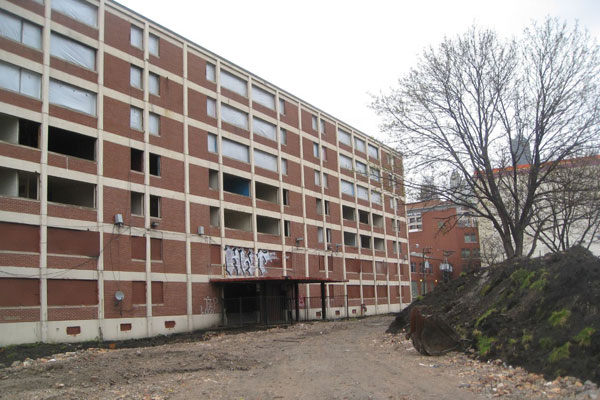
I was observing to someone recently—the context escapes me—that when I was becoming aware of politics, say from about 1988 through 1996, you couldn’t get through a campaign at any level of government without a candidate from either major political party attempting to one-up his or her opponent with regards to the harshness with which we should treat criminals.
I’d put the apex at 1992, when Phil Hartman parodied Bill Clinton’s campaign rhetoric on Saturday Night Live, bragging that Arkansas led the nation in crushing criminals with heavy rocks. If that’s not conclusive enough evidence, 1992 is about when nationwide violent crime rates hit their postwar peak (property crimes also peaked around that time, though they remained under 1980 levels).
Since then violent crime has been on the decline. But many of the laws that were formulated as a result of rising violent-crime rates remain on the books. This (bi)month in the Chicago Reporter, Angela Caputo takes a look at the Chicago Housing Authority’s use of the "one-strike" rule for public housing, which allows for—it does not require—the eviction of leaseholders, among other things, for "any drug-related criminal activity on or off the premises performed by the Resident, any member of the household, a guest, or another person under the Resident’s control."
Which can obviously be interpreted broadly, and has been interpreted to include not just convictions but arrests, even when the charges are thrown out of court. And as the Reporter‘s analysis of 1,420 cases shows, the number of evictions based on misdemeanors is on the rise, while that on the basis of felonies is on the decline. In a companion piece, Dylan Cinti points out not only that the number of marijuana possession cases on which evictions are based has increased, but also that the largest group of those charged are 16 to 22 years old.
It’s an ongoing problem. In 2002, Jaime Kalven did a four-part series on one-strike evictions, one story being reminiscent of the mother whom Caputo profiled:
"The first One-Strike case I encountered at Stateway was a woman whose 16 year old son [Pat Evans and her son Arthur, pictured above] was getting caught up at the margins of the drug trade. She was heroic in addressing this. She was staying up all night to keep him from going out. She went head to head with gang leaders to say, "This is not your boy, this is my boy." She was on top of that kid; she was monitoring him; she was in his face. She participated in a demonstration of mothers marching between two warring buildings at Stateway during a gang war. The "innocent tenant" or the "lack of knowledge" defense wasn’t available to her, because she had knowledge.
You may also recall the case of Eugene Bailey, whose family was threatened with eviction after her son was charged with murder in the beating death of Derrion Albert; the CHA had to backpedal after it turned out he was innocent, the case was dropped, and the media got wind of the intent-to-evict notice.
For more, I highly recommend "Called ‘Out’ at Home: The One Strike Eviction Policy and Juvenile Court" (PDF) by Wendy Kaplan and David Rossman of Boston University, which offers substantial additional information on the rule as it relates to young residents of public housing.
In similar news, WBEZ’s Natalie Moore has a story on a new Shriver Center report by Marie Claire Tran-Leung about how subsidized housing developments use criminal background checks that go back decades when screening for residents. Tran-Leung’s report (PDF) starts off with the story of a homeless Chicagoan, Keith Landers, who also faced rejection because of arrests that didn’t result in conviction:
Long stretches of homelessness had subjected Mr. Landers to frequent questioning by the police. Sometimes, he was arrested for offenses, such as public drinking, that arose simply from living out in the open and in close proximity to other people on the streets. Never, however, was he convicted of a crime. In fact, each and every one of his criminal arrests was dismissed.
Despite Mr. Landers‘ testimony that he never engaged in the criminal activity for which he was arrested, the CHA still cited the results of his criminal background check in rejecting his application. Only after Mr. Landers successfully challenged this rejection in the Illinois circuit and appellate courts did the CHA finally admit him into its public housing program. In the courts, the fate of Mr. Landers‘ housing turned on whether his arrests alone constituted a "history of criminal activity"—a standard the CHA and many public housing authorities use for rejecting applicants.
Photograph: BluEyedA73 (CC by 2.0)


